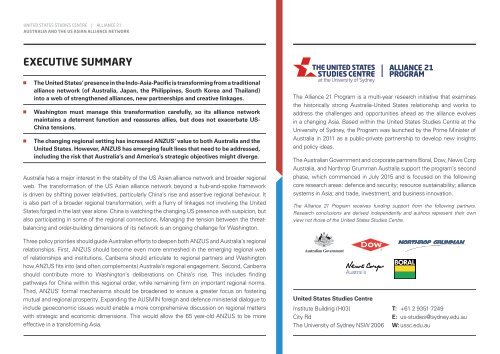ALLIANCE NETWORK
A21AsiaReport
A21AsiaReport
You also want an ePaper? Increase the reach of your titles
YUMPU automatically turns print PDFs into web optimized ePapers that Google loves.
UNITED STATES STUDIES CENTRE | <strong>ALLIANCE</strong> 21<br />
AUSTRALIA AND THE US ASIAN <strong>ALLIANCE</strong> <strong>NETWORK</strong><br />
EXECUTIVE SUMMARY<br />
■■<br />
■■<br />
■■<br />
The United States’ presence in the Indo-Asia-Pacific is transforming from a traditional<br />
alliance network (of Australia, Japan, the Philippines, South Korea and Thailand)<br />
into a web of strengthened alliances, new partnerships and creative linkages.<br />
Washington must manage this transformation carefully, so its alliance network<br />
maintains a deterrent function and reassures allies, but does not exacerbate US-<br />
China tensions.<br />
The changing regional setting has increased ANZUS’ value to both Australia and the<br />
United States. However, ANZUS has emerging fault lines that need to be addressed,<br />
including the risk that Australia’s and America’s strategic objectives might diverge.<br />
Australia has a major interest in the stability of the US Asian alliance network and broader regional<br />
web. The transformation of the US Asian alliance network beyond a hub-and-spoke framework<br />
is driven by shifting power relativities, particularly China’s rise and assertive regional behaviour. It<br />
is also part of a broader regional transformation, with a flurry of linkages not involving the United<br />
States forged in the last year alone. China is watching the changing US presence with suspicion, but<br />
also participating in some of the regional connections. Managing the tension between the threatbalancing<br />
and order-building dimensions of its network is an ongoing challenge for Washington.<br />
The Alliance 21 Program is a multi-year research initiative that examines<br />
the historically strong Australia-United States relationship and works to<br />
address the challenges and opportunities ahead as the alliance evolves<br />
in a changing Asia. Based within the United States Studies Centre at the<br />
University of Sydney, the Program was launched by the Prime Minister of<br />
Australia in 2011 as a public-private partnership to develop new insights<br />
and policy ideas.<br />
The Australian Government and corporate partners Boral, Dow, News Corp<br />
Australia, and Northrop Grumman Australia support the program’s second<br />
phase, which commenced in July 2015 and is focused on the following<br />
core research areas: defence and security; resource sustainability; alliance<br />
systems in Asia; and trade, investment, and business innovation.<br />
The Alliance 21 Program receives funding support from the following partners.<br />
Research conclusions are derived independently and authors represent their own<br />
view not those of the United States Studies Centre.<br />
Three policy priorities should guide Australian efforts to deepen both ANZUS and Australia’s regional<br />
relationships. First, ANZUS should become even more enmeshed in the emerging regional web<br />
of relationships and institutions. Canberra should articulate to regional partners and Washington<br />
how ANZUS fits into (and often complements) Australia’s regional engagement. Second, Canberra<br />
should contribute more to Washington’s deliberations on China’s rise. This includes finding<br />
pathways for China within this regional order, while remaining firm on important regional norms.<br />
Third, ANZUS’ formal mechanisms should be broadened to ensure a greater focus on fostering<br />
mutual and regional prosperity. Expanding the AUSMIN foreign and defence ministerial dialogue to<br />
include geoeconomic issues would enable a more comprehensive discussion on regional matters<br />
with strategic and economic dimensions. This would allow the 65 year-old ANZUS to be more<br />
effective in a transforming Asia.<br />
United States Studies Centre<br />
Institute Building (H03)<br />
City Rd<br />
The University of Sydney NSW 2006<br />
T: +61 2 9351 7249<br />
E: us-studies@sydney.edu.au<br />
W: ussc.edu.au


